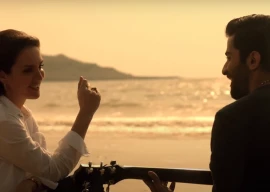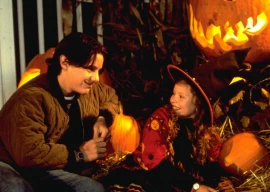
The movie is based on a true story in which Turing (played by the ubiquitous Benedict Cumberbatch) is hired along with a team of fellow mathematicians to break Nazi Germany’s ridiculously complicated communication code called Enigma. While soldiers are dying and London is bombed, the team is furiously at work in the English countryside at a mansion called Bletchley park, the English code-breaking headquarters posing as a radio manufacturing unit. Turning is a sociopath, hated by his superiors and coworkers alike, some of whom he fires in his first act as the leader of the unit. The team that is left includes Joan Clarke (a deft Keira Knightley) and Hugh Alexander (played by Matthew Goode). After the code is broken around the halfway point — hardly a spoiler — the film picks up pace, leaving moral problems for the audience and characters to deal with, unlike the math problems which the audience was deprived from during the first half. There’s talk of double agents, moral conundrums dealt crudely by the amoral metric of utilitarianism and Turing’s homosexuality that leads to his arrest and ultimately his suicide nine years after the war.
The movie is riddled with a number of predictabilities. This includes the expected list of decorations applied by director Morten Tyldum to convince the audience of Turing and his team’s credentials: a two-time chess champion, child prodigies (Turing complains of not having changed the world at the age of 27), attending elite private schools and solving crossword puzzles in impossibly little time. In fact, there is hardly anything new in the film. Turing is abrasive, arrogant and eccentric (similar to the Sherlock Holmes character played by Cumberbatch) and his superiors are stuffy, angry codgers (Charles Dance, from Tywin Lannister fame) or shady, manipulative super spies (Mark Strong) who are hardly inclined to be sympathetic or supportive of Turing.
Unlike previous films which have also highlighted the lives of math geniuses, such as the highly applauded A Beautiful Mind or even the highly-criticised 21, The Imitation Game features plenty of shots of random equations that mean nothing to either the characters or the audience.
But there is some good in this film and it emanates from the lead performances. Like his other characters Cumberbatch brings a familiar intensity to Turing that his fans have perhaps greedily become accustomed to and it works particularly well in this film. He also brings a sense of vulnerability — teary eyes, a subtle stammer and a look of innocence — that make both the man and the actor, and ultimately the movie, still compelling. Knightley has her own struggle as a woman mathematician in a male-dominated, sexist world (a struggle tragically as difficult today as it was then), but it inevitably has to give way to Cumberbatch’s.
The Imitation Game is nothing but convention, but admittedly that too has merit.

Published in The Express Tribune, Sunday Magazine, January 25th, 2015.
COMMENTS (1)
Comments are moderated and generally will be posted if they are on-topic and not abusive.
For more information, please see our Comments FAQ


1719660634-1/BeFunky-collage-nicole-(1)1719660634-1-165x106.webp)

1732276540-0/kim-(10)1732276540-0-165x106.webp)


1730355716-0/Copy-of-Untitled-(59)1730355716-0-270x192.webp)
1730276684-0/Copy-of-Untitled-(55)1730276684-0-270x192.webp)
1730095495-1/WhatsApp-Image-2024-10-28-at-11-04-18-(1)1730095495-1-270x192.webp)







"a struggle tragically as difficult today as it was then". Nice work trying to do a little feminist pandering, but it's at least glib if not wilfully ignorant to suggest no cultural progress has occurred in the Mathematical world since the 50s.